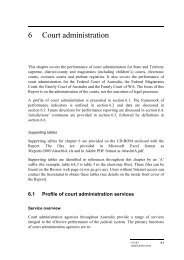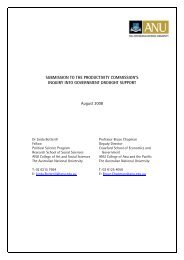Dr Emma Aisbett and Jonathan Bonnitcha (PDF - 202 - Productivity ...
Dr Emma Aisbett and Jonathan Bonnitcha (PDF - 202 - Productivity ...
Dr Emma Aisbett and Jonathan Bonnitcha (PDF - 202 - Productivity ...
You also want an ePaper? Increase the reach of your titles
YUMPU automatically turns print PDFs into web optimized ePapers that Google loves.
There exists a basic conceptual flaw in the argument that providing legal protection to foreign<br />
investment encourages more efficient regulatory decision making. On the arguments own premises,<br />
decision makers are more sensitive to the costs <strong>and</strong> benefits of a decision if the government is<br />
forced to bear the costs of the decision directly. This assumption implies that decision‐makers are<br />
sensitive to only those private costs that the government is forced to bear. Any system of liability<br />
that requires government to compensate foreign investors for economic loss that is not coupled<br />
with an equivalent system of protection for all other economic actors will encourage decision‐<br />
makers to over‐value the interests of foreign investors. Moreover, the assumption of sensitivity<br />
implies that decision‐makers under‐estimate any economic benefits of a decision unless they are<br />
able to be captured by the government. On this basis, making decision makers bear the costs of a<br />
policy when they cannot capture its benefits would lead to inefficient reluctance to alter the status<br />
quo. 22<br />
A reluctance on behalf of policy‐makers to alter the status quo on (otherwise known as regulatory<br />
chill) may also arise in the context of investment protection because of uncertainty about how a<br />
particular regulatory action will be viewed by the extra‐national tribunals which arbitrate claims<br />
brought by investors against host states. The inconsistency of the findings of arbitral tribunals is an<br />
ongoing concern among legal scholars in this field. 23<br />
3. Recommendations<br />
Recommendation 1: Future Australian FTAs should not include provisions providing post‐<br />
establishment protection for foreign investment.<br />
Given that there are few benefits <strong>and</strong> potentially significant costs to offering post‐establishment<br />
protection to foreign investment, we recommend that these provisions be omitted in future<br />
Australian FTAs.<br />
This policy has been successful elsewhere. For example, the European Union has achieved a high<br />
level of investment liberalisation within its membership. However, member countries do not provide<br />
protection to foreign investment originating from one another. 24 Brazil – a resource‐rich capital‐<br />
22<br />
V Been <strong>and</strong> J Beauvais, 'The Global Fifth Amendment? NAFTA's Investment Protections <strong>and</strong> the Misguided<br />
Quest for an International "Regulatory Takings" Doctrine' (2003) 78 New York University Law Review 30<br />
23 LE Peterson <strong>and</strong> K Gray, International Human Rights in Bilateral Investment Treaties <strong>and</strong> in Investment<br />
Treaty Arbitration (2003); High Commissioner for Human Rights, Economic, Social <strong>and</strong> Cultural Rights: Human<br />
rights, trade <strong>and</strong> investment (2003); G Van Harten <strong>and</strong> M Loughlin, 'Investment Treaty Arbitration as a Species<br />
of Global Administrative Law' (2006) 17 (1) European Journal of International Law 121.<br />
24<br />
With the exception of a small number of BITs agreed between ‘old’ European states <strong>and</strong> ‘new’ European<br />
states many years before the latter joined the EU.

















